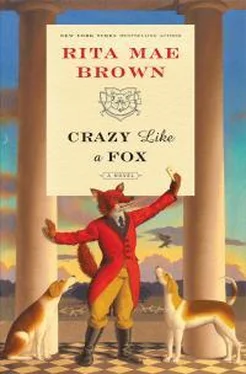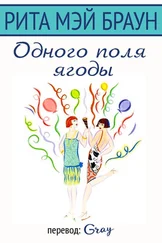“Ta Ta.” Golliwog licked her little dish, which Sister had thoughtfully put out.
“Why do you feed her at the table?” Betty must have asked this a thousand times.
“If she has a proper place setting, good china, she acts like a lady.”
“Oh, my God.” Betty rolled her eyes, then exploded into laughter.
“Betty, you wouldn’t believe how Golly manipulates our mother. Shameful it is. Awful to behold.” Raleigh cast his limpid brown eyes at the attractive Betty, perhaps ten pounds overweight.
The impromptu lunch group ate, the humans weakening and tossing bits to the dogs, Sister placing more turkey on the cat’s plate. They talked about hunting, the weather, people, the subjects old friends visit and revisit.
“So she organized her classes around hunting?” Betty savored an avocado slice.
“Well, she did it last year. Tootie, thanks to her board scores and grades, had no trouble getting into UVA from Princeton. She doesn’t want to go full time. If she does it this way, she’s happy.”
“And you said she’s taking organic chemistry?” Betty leaned toward her friend. “As a freshman?”
“Well, she’s half a sophomore. They accepted her first semester grades from Princeton, finally. So far she loves it.”
“More power to her. I would hate it.” Betty pointed a fork at Sister. “And you, a geology major.”
“Like Tootie, I loved what I studied.”
Betty put down the fork, pointed to her forehead. “Box of rocks.”
“Never said I was bright.” Sister laughed. “Or you!”
Table cleared, Betty pulled out paper and pencils. Doing a fixture card on a computer had proved counterproductive for both of them. Maps were spread all over the table. They kept checking them, studying the blue outlines signifying estates, farms, raw land where they had permission to hunt. Red outlines meant no hunting. Fortunately, there were few of those. Couldn’t really do that with computers squatting on top of the topo maps.
Tedious as the chore could be, they compared notes about landowners, those wonderful people who gave the club permission to hunt over their lands, notes about terrain, and wind direction. Two heads bent over large colored maps from the U.S. Geological Survey.
What joy to work with a beloved friend. Neither woman could know that in twenty-four hours their world would be topsy-turvy. Fortunately, both had a good sense of humor. They would need more than that.
CHAPTER 6
A fine mist like a thin white veil covered Tattenhall Station on Saturday, September 16, at seven-thirty A.M. The temperature, 50°F, promised an hour of decent scenting given the moisture, but the morning would warm up, the mist would disappear, and with it, the scent.
Sister usually kept young entry near the home fixtures during cubbing. As they walked this country all summer, if a youngster wandered off, rarely, or overran the line way too far, the hound would know where it was and find the way back to the horn, the pack, or if all else failed, the kennels.
But this year’s young entry and last year’s entry, now second year, had worked together so well, so early, Sister thought to take a chance and go to this westernmost fixture, the former Norfolk and Southern railroad station. Across the road farther west reposed Old Paradise, once one of the most beautiful estates in Virginia, started by a very pretty woman right after the War of 1812. Thanks to her robbing British pay wagons and supply wagons, all that delightful money rolled in as Sophie Marquet kept the cash and sold the supplies to the American forces at a patriotic discount. Old Paradise, at five thousand acres, had been poached by Crawford Howard. He rented it from the two DuCharme brothers, neither of whom could keep up the place, neither of whom had spoken to the other since 1960, improved it, then laid cash on the barrel. They caved and sold.
When The Jefferson Hunt had Old Paradise as a fixture, that land, when combined with Tattenhall Station and some surrounding estates, plumped out at twelve thousand acres. What fabulous hunting, fabulous views. The DuCharmes apologized profusely to Sister. She said she understood. She did.
As Crawford painstakingly brought back the glorious huge stone stables, revived the fields, restored the fences, Kasmir Barbhaiya refurbished the old train station, allowing the hunt to use it as a clubhouse while he restored Tattenhall lands to fertility, building a surprisingly modest house, a true old-style Virginia center-aisle frame farmhouse with a wraparound porch. Crawford, knowing he couldn’t outspend Kasmir, for a rich Indian is rich beyond most rich Americans, practically reeled back in shock when he beheld the pleasing, proportional light yellow clapboard farmhouse with Charleston green shutters. He felt it was a rebuke to his plans of grandeur, and it was. Kasmir had no need to show off. Indian he may have been, but he acted like a true old-blood Virginian.
Crawford sniffed that this was the result of the British ruling India as long as they did. The elite packed off their sons to Harrow, Eton, Groton, then university in England, so the boys became as upper-class British as the British, which is also to say, in many ways, Virginian.
What Crawford didn’t say or realize was that he was vulgar. Everyone else said it for him.
This Saturday a field of fifty-nine people showed up, including Sara Bateman. Each week more Jefferson members joined the hunt as the excitement grew and the mercury slowly, too slowly, dropped. They also missed their friends.
They didn’t miss much today. Shaker cast from the back of the train station; the hounds struck a line in a skinny minute, opened wide, and ran due east.
Sister, grateful that she rode Matador, a former steeplechaser, sailed over a stiff seven-board coop, stiff to keep out the cattle now on Old Paradise. Crawford put up fencing, but he didn’t realize that some cattle are fence walkers and if they’re not policed or put in pastures with stout fencing, those buggers will get out.
A seven-board coop is anywhere from three foot six inches to three foot nine inches, depending on the width of the boards. Taking such an obstacle at a gallop clearly was not for the fainthearted. A few checked their horses, waiting for Bobby Franklin to come up to a gate where they now joined Second Flight. Everyone else made it over the coop and the hounds were flying, just flying.
The huge pasture dipped down a bit toward a narrow creek running toward a much larger broad creek, which flowed easterly. As that creek fed into another, the waters eventually would find their way to the mighty James River and thence to the ocean a good one hundred fifty miles away, depending on the topography.
The creek itself proved no obstacle, but the additional moisture created slippery footing as the horses leapt over. Again everyone made it, but not without a bobble or two.
Betty Franklin whipped-in on the right while Tootie Harris performed this service on the left. Tootie, young and supple, seemed a part of Iota, her own horse. Part of her salary included Iota’s board, since her father had withdrawn all economic support.
The fox, a half-grown son of Earl, the red who lived in Crawford’s restored stone stable, had never been hunted before. Like the young hounds, he had to learn.
Dragon, in the lead, couldn’t close the gap, for the little fellow had quite a start. Suddenly the scent evaporated. Hounds stopped.
“Noses to the ground,” Diana ordered.
“Why does this happen?” Pickens, a second-year, whined.
“Happens more during cubbing,” Trident, older, answered. “The temperature bounces around and so does the scent. Keep at it. We might pick it up again.”
Dragon, a braggart, announced, “Lucky fox. I would have chopped him.”
Читать дальше












